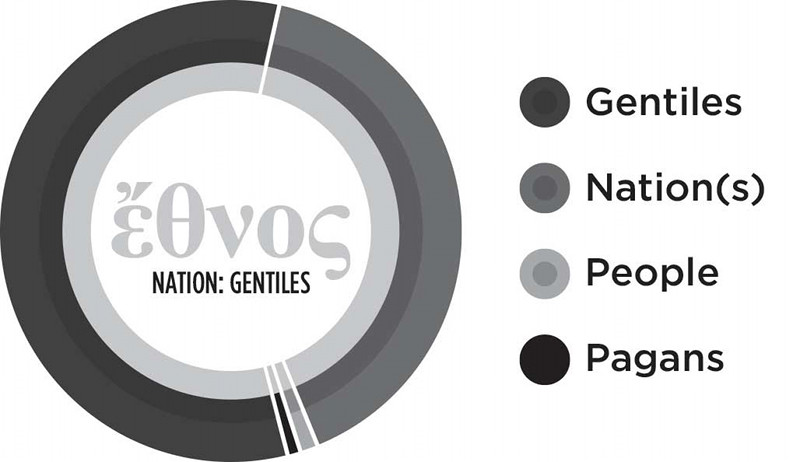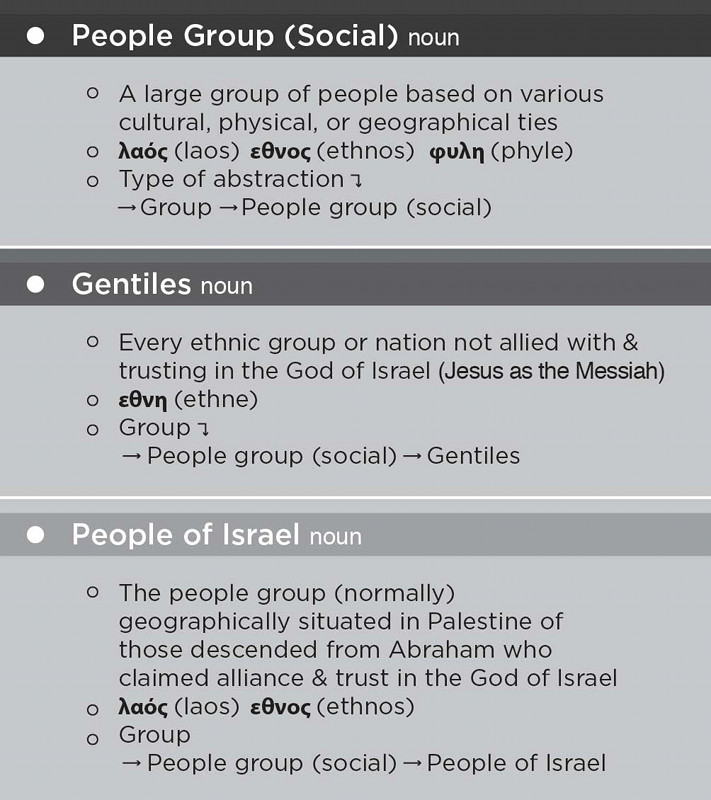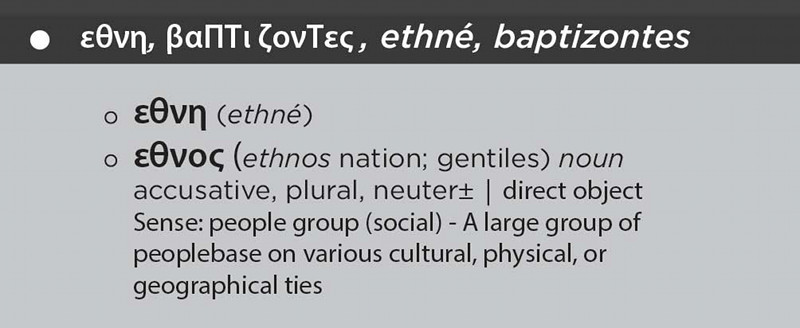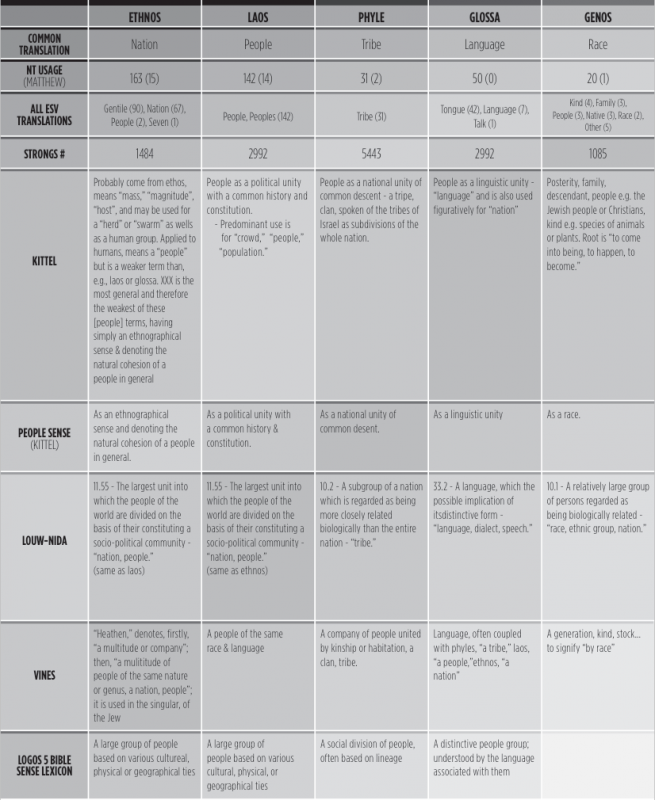The Meaning of Ethne in Matthew 28:19

Introduction:
At the Finish the Task (FTT) annual conference held in California, December 2012, the following question was raised by Paul Eshleman and subsequently commissioned which resulted in this white paper:1 “Why should castes be included in the ethnē?” There are good tactical reasons why these groups should be approached separately. However, as he well noted, “the question is, what is the biblical basis for including them, if any? The biblical meaning needs to be accurate and then properly applied to our strategies for reaching the nations of the world.”
FTT and the related Issachar initiative, led by Paul Eshleman, partner with Transform World 2020: Christ’s Missional Challenge which is facilitated by the U.S. Center for World Mission (USCWM) and chaired by Dick Eastman of Every Home for Christ.
 The task of this word study is to pursue the answer to the question “what was the intended meaning of the New Testament author Matthew as he was carried along by the Holy Spirit, (2 Pet. 1:21) to write in Matthew 28:19 “make disciples of all ethnē?” In order to understand the biblical basis of the meaning of the term ethnē the white paper is organized by means of a review of the meaning of ethnē in Greek literature beginning in the classical period, from New Testament literature, with specific concern for New Testament usages, particularly in the book of Matthew with special concern for the meaning in the Great Commission Mandate verse of Matthew 28:19.
The task of this word study is to pursue the answer to the question “what was the intended meaning of the New Testament author Matthew as he was carried along by the Holy Spirit, (2 Pet. 1:21) to write in Matthew 28:19 “make disciples of all ethnē?” In order to understand the biblical basis of the meaning of the term ethnē the white paper is organized by means of a review of the meaning of ethnē in Greek literature beginning in the classical period, from New Testament literature, with specific concern for New Testament usages, particularly in the book of Matthew with special concern for the meaning in the Great Commission Mandate verse of Matthew 28:19.
Overview
According to the analysis by the Content Innovation Team (CIT) at Logos Bible Software, (http://www.logos.com) based on a review of lexical and exegetical resources, the Greek word ethnos is translated into the English Bible by the term Gentiles, 84 of 161 times that it is used in the New Testament; the term nation 63 of 161 times, the term people 6 of 161 times, the term pagan 6 of 161 times and the term country and heathen, one time. Of the fourteen times Matthew uses the word ethnos seven times refer to nations and five times to Gentiles. What about in Matthew 28:19? That is the question we need to answer in this report.
Following review of the meaning in respected lexical and exegetical sources that bring shades of light to the understanding of the term ethnē used in Matthew 28:19 the final decision made by the CIT will be considered. The Content Innovation Team (CIT) at Logos has used technology to bring a new degree of accuracy due to the ability to search, analyze and process hundreds of resources to produce the Bible Sense Lexicon. A list of these resources appears in an email sent to the author of this white paper.2 The Sense definition is a specific, contextual definition within any particular verse for a Greek word in the New Testament. For example, for the Greek word kosmos they concluded as follows: “This word may have 12 different meanings, but the Content Innovation Team (CIT) at Logos believes that in John 3:16, it means world populace!”
The word sense analysis undertaken in Logos Version 5 Bible Software highlights four primary meanings for the word ethnos in the figure above, which are Gentiles, nation, people and pagans. The definition of the CIT for people group, gentiles and people of Israel appears in the following figure.

With this overview we can now analyze several resources commonly used to understand the contextual meaning of a Greek word in the New Testament beginning with the classical period.
Classical (up to 300 BC)
Old Testament Greek translation was done between 300 and 200 BC. The Septuagint which is sometimes abbreviated LXX is the name given to the Greek translation of the Jewish Scriptures. The Abrahamic promise in Genesis uses the phrase “all the nations” (kol goiey) which the Septuagint translates with panta ta ethnē, which is found in Mat. 28:19 (Gen. 18:18; 22:18; 26:4). For example, in Genesis 18:18 we read “Abraham will surely become a great and powerful nation, and all nations” (panta ta ethnē) “on earth will be blessed through him.”
The primary authority in the classical period was H.G. Liddell, dean of Oxford for 36 years. He was the compiler of the Greek Lexicon, along with Robert Scott. Together they produced A Lexicon: Abridged from Liddell and Scott’s Greek-English Lexicon in which the entry for ἔθνος (ethnos) includes a reference to caste pertinent to the discussion in this white paper.
ἔθνος τό: (ethnos to)— a number of people accustomed to living together, a company, body of men, etc.; ἔθνος λαῶν (ethnos laon) a host of men; also of animals, swarms, flocks, Ib., Soph.
- after Hom., a nation, people, Hdt., etc.:—in N.T.
- τὰ ἔθνη (ta ethne) the nations, Gentiles, i.e. all but Jews and Christians.
- a special class of men, a caste, tribe, Plat., Xen.
In conclusion, the classical usage--up to the year 300 BC--of the word ethnos, according to the standard Greek-English Lexicon by Liddell and Scott, does include the meaning of a special class of men, a caste, or tribe used both in the writings of Plato and Xenophanes.
New Testament (1st Century AD)
Tools: BDAG3, A Greek English Lexicon of the New Testament and other early Christian literature. A lexicon is defined as being “an alphabetically arranged book setting forth the meaning and etymology of the words of a language; a dictionary; specifically applied to dictionaries of Latin, Greek, or Hebrew.” Walter Bauer (1877-1960) of Gottingen in Germany, undertook a systematic search in Greek literature down to Byzantine times which was translated into English by Arndt and Gingrich. Their comment in the foreward of the Lexicon was that Bauer’s analysis and arrangement of the small words so frequently used is a great improvement over anything of its kind previously done.”
ἔθνος, ους, τό (ethnos)
1. A body of persons united by kinship, culture, and common traditions, nation, people
- Singular: τὸ ἔθνος τῆς Σαµαρείας (ethnos Samareias) the Samaritan people Ac 8:9 (cp. Jos., Ant. 18, 85).
- The people in contrast to heads of state Ac 9:15. ἔθνος ἐπὶ ἔθνος (ethnos epi ethnos) one nation against another Mt 24:7; Mk 13:8; Lk 21:10 (cp. 2 Ch 15:6);
- Plural: πάντα τὰ ἔθνη (panta ta ethnē)
- Mt 24:14; 28:19
- πάντα τὰ ἔθνη τοῦ κόσµου
- (ethnē tou kosmou) Lk 12:30;
- πᾶν ἔθνος ἀνθρώπων (pan ethnos anthrōpōn) every nation of humankind Ac 17:26.
- In Mt 21:43 ἔθνη (ethnē) (not gentiles) in contrast to the leaders described vv. 23; 45.
2. (τὰ) ἔθνη (ta ethne) people groups foreign to a specific people group
a. those who do not belong to groups professing faith in the God of Israel, the nations, gentiles, unbelievers (in effect=‘polytheists’) with ἡγεµόνες κai βασιλεῖς (hēgemonas kai basileis) Mt 10:18.
b. non-Israelite Christians, gentiles of Christian congregations composed of more than one nationality and not limited to people of Israel πᾶσαι αἱ ἐκκλησίαι τῶν ἐθνῶν (pasai hai ekklēsiai ton ethnōn) Ro 16:4.
In conclusion, in the authoritative Greek-English Lexicon of the New Testament and Other Early Christian Literature the primary definition of the word ethnos is a body of persons united by kinship, culture, and common traditions. The culture and common traditions of India are rooted in a caste system.
Scholarship from 1st Century to 1948
Theological Dictionary of the New Testament editor Gerhard Kittel, a German biblical scholar who died in 1948, was professor of the New Testament at Tubingen University in East Germany.
This word, which is common in Greek from the very first, probably comes from ἔθος (ethnos), and means “mass” or “host” or “multitude” bound by the same manners, customs or other distinctive features. Applied to men, it gives us the sense of people; but it can also be used of animals in the sense of “herd” or of insects in the sense of “swarm” [though cf. also ἔθνος µελισσῶν (ethnos meilisōn) for the race of bees). The original sense may still be seen in the πᾶν ἔθνος ἀνθρώπων (pan ethnos anthrōpōn)]of Acts 17:26.
The synonyms of ἔθνος (ethnos) provide insight into the nuances of the meaning of the terms related to peoples. The synonyms express delicate shadings of connotation that provides an important distinction that bears directly upon the question of the biblical basis for castes in the term ἔθνος (ethnos) in Matthew 28:19. In most cases ἔθνος (ethnos) is used of men in the sense of a “people.”
Synonyms of ἔθνος (ethnos) are φυλή (phylē) (people as a national unity of common descent), λαός (laos) (people as a political unity with a common history and constitution) and γλῶσσα (glossa) (people as a linguistic unity). ἔθνος (ethnos) is the most general and therefore the weakest of these terms, having simply an ethnographical sense and denoting the natural cohesion of a people in general.4
The book of “Revelation often places ἔθνος (ethnos) in a series with λαός (laos), φυλή (phylē), and γλῶσσα (glossa), especially in hymnic sayings (5:9; 7:9; and 14:6); thus it is said that all peoples are affected without distinction by the judgment and grace of the one God.”5
In Appendix A, prepared by Dan Scribner, the various words used in the NT for peoples, languages, nations etc. in Revelation 5:9 are compared. Some combination of these terms appears seven times in Revelation 5:9; 7:9; 10:11; 11:9; 13:7; 14:6; 17:15. The emphasis of these combinations is on completeness, totality, fullness. By the author using ethnē rather than laos in Matthew 28:19 seems to suggest that distinctives other than race and language can define a people such as caste, community, culture and religion.
Again γλῶσσα (glossa) in the Revelation passages emphasizes people as a linguistic unity and is the Greek term that best expresses ethno linguistic peoples. In conclusion, as we consider the four synonyms used in the Bible related to peoples, the term ἔθνος (ethnos) relates to ethno cultural peoples as distinct from ethno linguistic peoples, γλῶσσα (glossa) or ethno political peoples, λαός (laos) or φυλή (phylē) which refers to people as a national unity of common descent. In South Asia ethno cultural peoples are usually identified by caste community.
- Etymologically, the term ethnos used in the New Testament probably comes from ἔθος (ethos), and means “mass” or “host” or “multitude” bound by the same manners, customs or other distinctive features. Applied to men, it gives us the sense of people. There are synonyms found in the New Testament including φυλή (phylē) (people as a national unity of common descent), λαός (laos) (people as a political unity with a common history and constitution) and γλῶσσα (glossa) (people as a linguistic unity). It is worthy of note that γλῶσσα (glossa) would be the likely Greek word used to describe ethno-linguistically distinct peoples.
- ἔθνος (ethnos) is the most general and therefore the weakest of these terms, having simply an ethnographical sense and denoting the natural cohesion of a people in general.
- The word ethnos (ethnos) appears in the New Testament 162 times
- Only 32 are singular
- The use of the 32 times in the singular is as follows: 13 times general, 18 times with reference to a specific people, once in reference to Christianity.
- Of the 130 plural uses 35 are anarthrous ἔθνη (ethnē) (i.e. they do not have a definitive article),
- but even of these anarthrous uses most plural uses have the meaning Gentiles which presupposes a qualifying distinction between (ὁ) λαός (laos) and (τὰ) ἔθνη (ta ethnē). Bible Sense Lexicon, Content Innovation Team (CIT) of Logos Bible Software.
Scholarship in the Present Day
In an attempt to identify the contextual meanings of Hebrew and Greek words, Logos developed the Bible Sense Lexicon in Logos Version 5. A Content Innovation Team (CIT) at Logos Bible Software which now has compiled more than 20,000 resources defines the meaning of a Greek or Hebrew word within a specific verse of the Bible which they call the Sense definition.
The new Sense line of information goes a long way in helping us disambiguate the meanings of biblical words within different verses in the Bible. For instance, the Greek word ethnē may have different meanings in the New Testament, but the Content Innovation Team (CIT) at Logos believes that in Matthew 28:19 it means a large group of people based on various cultural, physical, or geographical ties!

The figure above shows the word ethnē and the text of Mathew 28:19 followed by the more typical English translations in the New Testament of the word ethnos,
parses the word and then comes the word sense and a colon which is followed by the CIT definition of ethnē as used in Matthew 28:19.
Indian Bible Translators
Indian Bible translators use the word jati which means community/caste6 when they see the Greek word ethnē. This would suggest that community / caste is a valid part of ethnē particularly coming from India translators; not westerners.
Biblically Committed Mission Leaders Gathering in 1982
In March 1982 a group of mission leaders came together in Chicago for a meeting sponsored by the Lausanne Strategy Working Group. It was designed to help bring clarity and definition to the remaining or unfinished missionary task. At no time before or since this meeting has as large or as representative a group gathered for two days to focus specivfically upon the necessary definitions for a strategy to reach the unreached peoples.
While the results of this gathering describes a strategic definition which added tactical value to the notion of the unfinished task, the group was made of people totally committed to the biblical basis of primary texts related to the unfinished task such as Matthew 28:19 and the meaning of ἔθνος (ethnos) in πάντα τὰ ἔθνη (panta ta ethnē). It would be very unlikely they would incorporate a meaning for ἔθνος (ethnos) inconsistent with their understanding of the use of the term in Matthew 28:19. Two basic definitions were made at this gathering that have remained as the standard in relation to completing the unfinished task.
1. A People Group is “a significantly large grouping of individuals who perceive themselves to have a common affinity for one another because of their shared language, religion, ethnicity, residence, occupation, class or caste, situation, etc., or combinations of these.” For evangelistic purposes it is “the largest group within which the Gospel can spread as a church-planting-movement without encountering barriers of understanding or acceptance.”
2. An Unreached People Group is “a people group within which there is no indigenous community of believing Christians able to evangelize this people group.”
In the course Perspectives on the World Christian Movement which has been taken by an estimated 200,000 people around the world one of the main articles in The Perspectives Reader by Ralph D. Winter and Bruce A. Koch is titled: “Finishing the Task: The Unreached Peoples Challenge,” Dr. Winter references these two definitions as the standard for defining the unreached peoples challenge.
Conclusion
Although the most frequent translation of the word ethnos in the New Testament is Gentile followed by nation there are a few exceptions of which the use in Matthew. 28:19 is considered to be one of them. That is the conclusion of one of the most respected lexicons available known as BDAG. (In this Lexicon ethnē and its plural form: πάντα τὰ ἔθνη (panta ta ethnē). Matthew 24:14; 28:19 is defined as “a body of persons united by kinship, culture, and common traditions, nation, people.” This definition justifies the inclusion of caste in the word ethnē used in Matthew 28:19. Furthermore, the classical usage--up to the year 300 BC--of the word ethnos, according to the Standard Greek-English Lexicon by Liddell and Scott, does include the meaning of a special class of men, a caste, or tribe.
In examining the four synonyms used in the Bible related to peoples, it became apparent that the term ἔθνος (ethnos) relates to ethno cultural peoples as distinct from ethno linguistic peoples, γλῶσσα (glossa) or ethno political peoples, λαός (laos) or φυλή (phylē) which refers to people as a national unity of common descent. In South Asia ethno cultural peoples are usually identified by caste community. Biblically committed mission leaders who gathered in 1982 to define the unfinished task perpetuate the understanding of the task as inclusive of caste communities.
Indian Bible translators use the word jati which means community / caste when they see the Greek word ethnē.7 This would suggest that community / caste is a valid way of understanding the term ethnē.
Darrell L. Bock is a widely respected New Testament scholar and research professor of New Testament studies at Dallas Theological Seminary in Dallas, Texas concludes that in Matthew 28:19 “the phrase” ‘all peoples’ “is as inclusive as you can have.”8 F. Douglas Pennoyer, Dean, Cook School of Intercultural Studies Biola University and Board Chairman, Far East Broadcasting Company, and a past President of the Evangelical Missiological Society, after reading this white paper wrote: “Makes sense to me from a theological/anthropological point of view, speaking as an anthropologist/missiologist.”9 After review of this paper New Testament scholar, Walt Russell wrote: “I agree with Luis’ conclusion and would add that the castes of India are ‘people-groups.’ I would add that the function of castes brings greater distinctiveness to the caste members than many of those who are called ‘people-groups’ who share the same language (glossa), political unity (laos), or a common posterity (genos). In terms of inheriting a certain way of life, the castes seem far more powerful and enduring than the way of life inherited from most of the existing tribal common descents (phylē)!”10
The most accurate definition of the term ethnē used in Matthew 28:19 is based on the decision of the Content Information Team at Logos Bible Software with access to 20,000 Bible related resources electronically in an integrated system. Their conclusion is that ethnē in Matthew 28:19 means a large group of people based on various cultural, physical, or geographical ties! There is a strong biblical basis for including communities/castes in the term ethnē in Matthew 28:19.
Appendix









comments